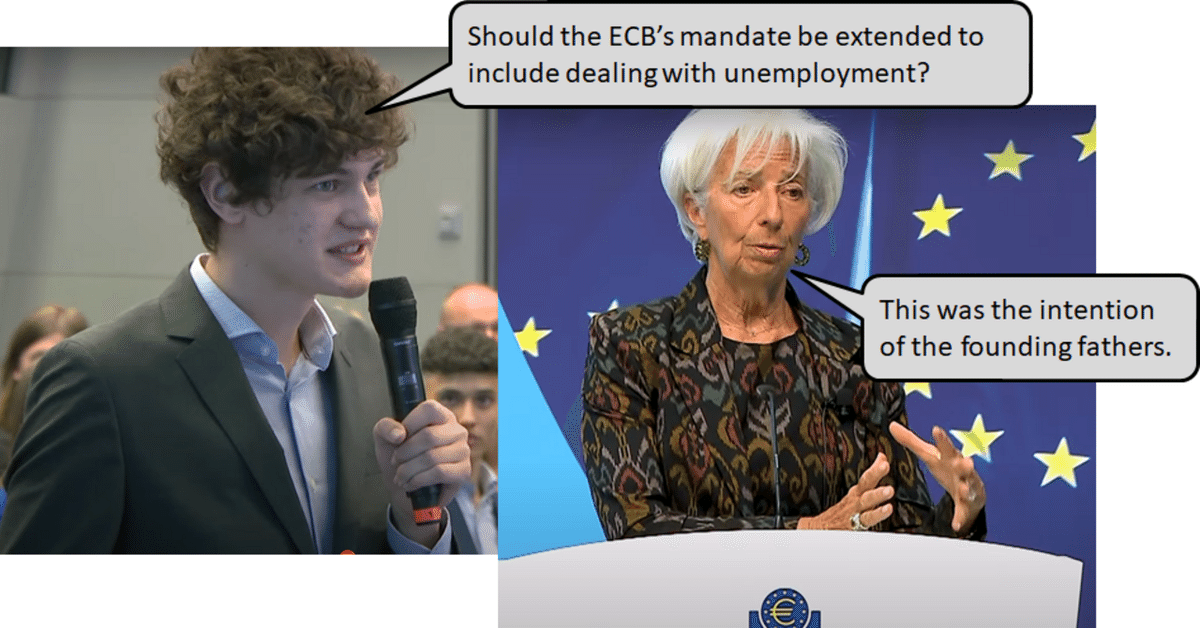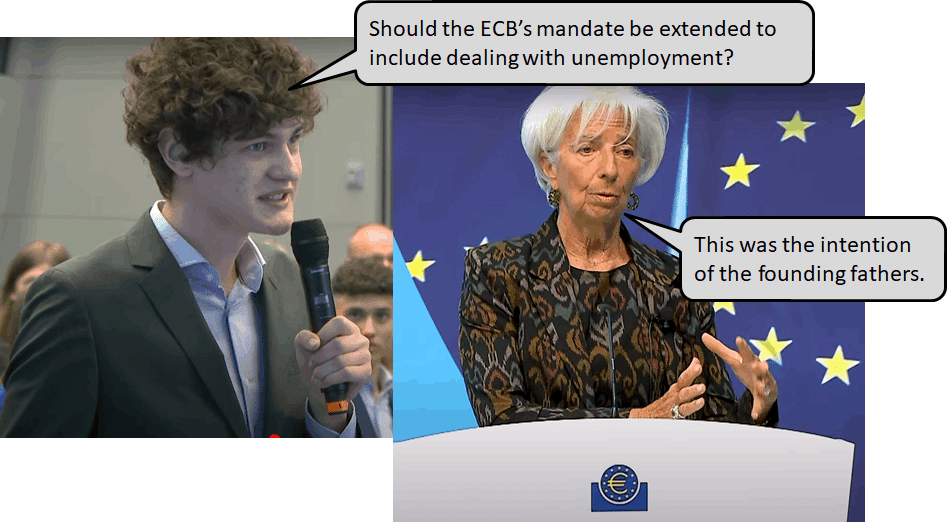
Generation Euro Students Award 2023 QA ③
2023年5月31日にECB主催で開催された Generation Euro Students Award での、ルクセンブルクチームからラガルド総裁への質問。
他チームからの質問は下記記事のいちばん下にあるリンクから辿れます。
URL
ルクセンブルクチームとの質疑応答は、動画の 17:20 ~ 19:15
Question
I want to ask a question of more structural nature.
Should the ECB’s mandate be extended to include dealing with unemployment like in the United States?
And if not, why not?

Answer
You know, ever since the start, in the treaty we have a very specific mandate that is laid out with a primary objective, and one single primary objective which is price stability.
And then we have secondary objectives which are also laid out in the same article of the treaty which refer to the economic policies that are led in the European Union.
And through that, obviously we have to take into account economic growth, trade, and employment.
And we are attentive to those secondary objectives, and the secondary objective if I recall correctly the wording is without prejudice to the first objective.
So the first one is the one that overrides everything else, but employment is necessarily taken into account, nonetheless.
This was the intention of the founding fathers.
I think that the best contribution that we, as a Central Bank, we can make to the economy and to as much employment if not full employment is to deliver price stability.
Because then (you know) economic actors know where they stand,
they know (you know) if and when to consume,
they know if and when to invest if they can have some predictability of the stability of the prices.
So that’s what we do.
So we take into account, we contribute to it, I’m not certain given the complexity of what my colleague from the FED has to do particularly at the moment whether having the two of them would be of great service.
Thank you.
Notes
You know, ever since the start, in the treaty we have a very specific mandate that is laid out with a primary objective, and one single primary objective which is price stability.
a primary objective と one single primary objective は同じこと。少し違う言い方で繰り返して言っている。ECBの目標はただ1つ、物価の安定である。
lay somebody/something out or lay out somebody/something はこの文脈では「条約に記載してある」
And then we have secondary objectives which are also laid out in the same article of the treaty which refer to the economic policies that are led in the European Union.
我々(ECB)には第2の政策目標もあります。これも条約の同じ条文に記載されています。その条文は経済政策に言及しており、EUの経済政策はこの条文に沿って運営されます。
これも非常に日本語に訳しにくい文章。特に「economic policies that are led in the European Union」のled(leadの過去分詞)が難しい。ここでは受動態で使用されているので他動詞であり、主語である「the economic policies」が何かによって lead されている。leadする主体は文章には明記されていないがおそらくEUの行政府(に属す官僚や政府高官たち)。以上を考慮して、上記のような日本語訳にしました。
the secondary objective if I recall correctly the wording is without prejudice to the first objective.
第2目標は、別の言葉で正確に言うならば、第1目標に対して不合理なバイアスを及ぼすことはないし及ぼしてはいけない、ということです。
文の構成が分かりにくいが、副詞節「if I recall correctly the wording」 が主語「the secondary objective」と述語「is」の間に入っている。
I think that the best contribution that we, as a Central Bank, we can make to the economy and to as much employment if not full employment is to deliver price stability.
本来はそれほど複雑な構文ではないと思いますが、話し言葉である故に、同じことを何度も繰り返している個所があって、日本人にはわかりにくくなっている印象です。たとえば、we, as a Central Bank, we は3回同じことを繰り返し言っています。繰り返しを除去してシンプルに書くなら
best contribution that we can meke to the economy
ですが、関係代名詞節中の主語「we」が「we, as a Central Bank, we」になっています。もう1つこの文でわかりにくいのは、最後の if 節「if not full employment is to deliver price stability」の主語が「not full employment」(完全雇用でない状態)であることでしょう。not を見るとnotとその周辺が動詞ではないか(主語はきっと省略されているんだ!)と思いがちなのは、私だけではないと思います。
I’m not certain given the complexity of what my colleague from the FED has to do particularly at the moment whether having the two of them would be of great service.
これもかなり複雑な構文。
まず、全体の構成は
I'm not certain (…) wheter ~
であり、「~かどうか確信が持てない」と言っています。そこで次に「~」とは何か、です。「~」の部分を抜き出すと、
having the two of them would be of great service.
です。「having the two of them」が主語(S)、「would be」が述語(V)、of great serviceが補語(C)です。「be of+名詞」で「be 形容詞」と同じ意味を表すので、「having the two of them」がとても役に立つだろう、という意味になります。
主語の中の two of them は FED の Dual Mandate(FEDの政策目標である雇用の最大化と物価の安定)を指しているので、「2つの政策目標を持つことがとても役に立つだろう」です。
このことについて I'm not certain wheter ~ と言っているので、文章全体では「2つの政策目標を持つことがとても役に立つかどうかは確信が持てない」という意味になります。
最後に、ここまでで説明していない
given the complexity of what my colleague from the FED has to do particularly at the moment
の部分ですが、文全体にかかる副詞句(分詞構文)になっています。
「what 以下の complexityを(所与の条件として)考えると」という意味になります。what以下は「FEDの同僚が今この時にやらなければいけないこと」、つまりインフレ(物価上昇)が収まらず雇用も弱くなるかもしれない(景気が悪くなるかもしれない)状況下で、物価の安定と雇用の最大化という二兎を追わなければいけない(追うことを法律で義務付けられている)という案件の複雑さを考えると、ということです。
Words
lay somebody/something out
lay out somebody/something
[phrasal verb]
to describe or explain something clearly
be to do something
ラガルド総裁の発言の中では、
if not full employment is to deliver price stability
で使われている。これも1対1に対応する日本語がなくて、都度どういう意味か困ることが多いフレーズの1つ。
used to talk about arrangements for the future(予定:することになっている)
used to give an order or to tell someone about a rule(義務:しなければならない)
used to say or ask what someone should do or what should happen
used to ask how something can be done
cf.) be to be seen/found/heard etc
used to say that something can be seen, found, or heard somewhere
全ての意味の共通項を取ると、比較的確度の高い未来のことを述べる時に使っているように見えます。しかもその未来はどちらかと言えば人の意思によってコントロールできる類のもので。そう考えると、be to とはかなり強い言葉(決意とか意思とかが込められた言葉)っぽいですね。
この記事が気に入ったらサポートをしてみませんか?
